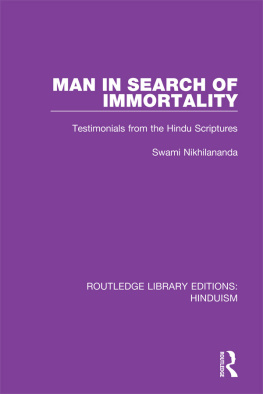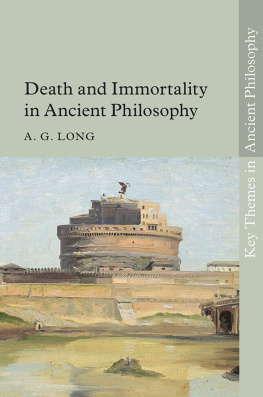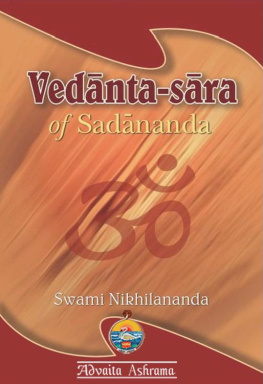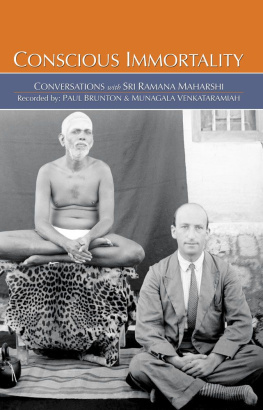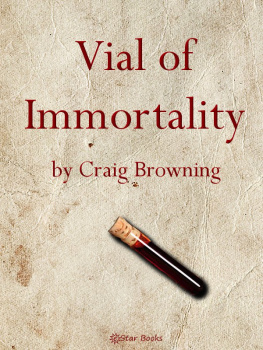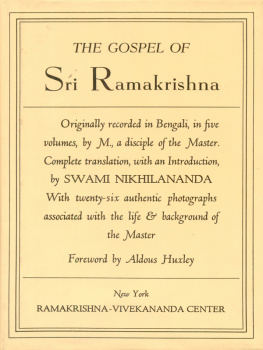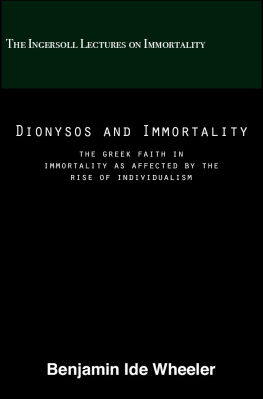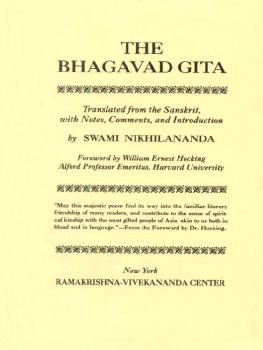Nikhilananda - Man in Search of Immortality
Here you can read online Nikhilananda - Man in Search of Immortality full text of the book (entire story) in english for free. Download pdf and epub, get meaning, cover and reviews about this ebook. publisher: Taylor & Francis (CAM), genre: Science. Description of the work, (preface) as well as reviews are available. Best literature library LitArk.com created for fans of good reading and offers a wide selection of genres:
Romance novel
Science fiction
Adventure
Detective
Science
History
Home and family
Prose
Art
Politics
Computer
Non-fiction
Religion
Business
Children
Humor
Choose a favorite category and find really read worthwhile books. Enjoy immersion in the world of imagination, feel the emotions of the characters or learn something new for yourself, make an fascinating discovery.
- Book:Man in Search of Immortality
- Author:
- Publisher:Taylor & Francis (CAM)
- Genre:
- Rating:4 / 5
- Favourites:Add to favourites
- Your mark:
- 80
- 1
- 2
- 3
- 4
- 5
Man in Search of Immortality: summary, description and annotation
We offer to read an annotation, description, summary or preface (depends on what the author of the book "Man in Search of Immortality" wrote himself). If you haven't found the necessary information about the book — write in the comments, we will try to find it.
Man in Search of Immortality — read online for free the complete book (whole text) full work
Below is the text of the book, divided by pages. System saving the place of the last page read, allows you to conveniently read the book "Man in Search of Immortality" online for free, without having to search again every time where you left off. Put a bookmark, and you can go to the page where you finished reading at any time.
Font size:
Interval:
Bookmark:
The following quotations are taken from Swami Nikhilanandas translations of The Bhagavad Gita (Ramakrishna-Vivekananda Center, New York), and The Upanishads (George Allen & Unwin Ltd., London, and Crown Publishers, New York).
The following quotations are taken from the Bhagavad Gita:
Never was there a time when I did not exist, nor you, nor these kings of men. Never will there be a time hereafter when any of us shall cease to be. (II, 12.)
Even as the embodied Self passes, in this body, through the stages of childhood, youth, and old age, so does It pass into another body. Calm souls are not bewildered by this. (II. 13.)
That calm man who remains unchanged in pain and pleasure, whom those cannot disturb, alone is able, O greatest of men, to attain immortality. (II, 15.)
The unreal never is. The Real never ceases to be. The conclusion about these two is truly perceived by the seers of Truth. (II, 16.)
That by which all this is pervaded know to be imperishable. None can cause the destruction of that which is immutable. (11, 17.)
Only the bodies, of which this eternal, imperishable, incomprehensible Self is the indweller, are said to have an end. Fight, therefore, O Bharata. (II, 18.)
He who looks on the Self as the slayer, and he who looks on the Self as the slainneither of these apprehends aright. The Self slays not nor is slain. (II, 19.)
It is never born, nor does It ever die, nor, having once been, does It again cease to be. Unborn, eternal, permanent, and primeval, It is not slain when the body is slain. (II, 20.)
He who knows the Self to be indestructible, eternal, unborn, and immutablehow can that man, O son of Pritha, slay or cause another to slay? (II, 21.)
Even as a person casts off worn-out clothes and puts on others that are new, so the embodied Self casts off worn-out bodies and enters into others that are new. (II, 22.)
Weapons cut It not; fire bums It not; water wets It not; the wind does not wither It. (II, 23.)
This Self cannot be cut nor burnt nor wetted nor withered. Eternal, all-pervading, unchanging, immovable, the Self is the same for ever. (II, 24.)
This Self is said to be unmanifest, incomprehensible, and unchangeable. Therefore, knowing It to be so, you should not grieve. (II, 25.)
The Self, which dwells in all bodies, can never be slain, O Bharata. Wherefore you should not mourn for any creature. (II, 30.)
The Lord said: Many a birth have I passed through, O Arjuna, and so have you. I know them all, but you know them not, O scorcher of foes. (IV, 5.)
The yogi who is happy within, who rejoices within, and who is illumined within attains freedom in Brahman, himself becoming one with Brahman. (V, 24.)
A yogi, striving diligently, is purified of all sins, and, becoming perfect through many births, reaches the Supreme Goal. (VI, 45.)
At the end of many births the man of wisdom seeks refuge in Me, realizing that Vasudeva is all. Rare indeed is such a high-souled person. (VII, 19.)
And whoso, at the time of death, leaves his body remembering Me alone and goes forthhe attains My being; concerning this there is no doubt. (VIII, 5.)
He who, at the time of passing away, steady in mind, filled with love, and armed with the strength of yoga, well fixes his prana between his brows and meditates on the omniscient and primal Being, the Ruler, the Dispenser of all, who is subtler than an atom, whose form is beyond comprehension, and who, like the glorious sun, is beyond all darknesshe who thus meditates reaches the resplendent Supreme Person. (VIII, 910.)
He who closes all the doors of the senses, confines the mind within the heart, draws the prana into the head, and engages in the practice of yoga, uttering Om, the single syllable denoting Brahman, and meditates on Mehe who so departs, leaving the body, attains the Supreme Goal. (VIII, 1213.)
At the end of a cycle all beings, O son of Kunti, enter into My Prakriti, and at the beginning of a cycle I generate them again. (IX, 7.)
He who does My work and looks on Me as the Supreme Goal, who is devoted to Me, who is without attachment and without hatred for any creaturehe comes to Me, O Pandava. (XI, 55.)
Fix your mind on Me alone, rest your thoughts on Me alone, and in Me alone you will live hereafter. Of this there is no doubt. (XII, 8.)
When the embodied soul has risen above the three gunas of which its body is made, it gains deliverance from birth, death, old age, and pain and becomes immortal. (XIV, 20.)
The deluded do not perceive him when he departs from the body or dwells in it, when he experiences objects or is united with the gunas; but they who have the eye of wisdom perceive him. (XV, 10.)
Take refuge in Him alone with all your soul, O Bharata. By His grace will you gain Supreme Peace and the Everlasting Abode. (XVIII, 62.)
Fix your heart on Me, give your love to Me, worship Me, bow down before Me; so shall you come to Me. This is My pledge to you, for you are dear to Me. (XVIII, 65.)
The following quotations are taken from The Katha Upanishad:
The knowing Self is not born; It does not die. It has not sprung from anything; nothing has sprung from It. Birthless, eternal, everlasting, and ancient, It is not killed when the body is killed. (I. ii. 18.)
If the killer thinks he kills and if the killed man thinks he is killed, neither of these apprehends aright. The Self kills not, nor is It killed. (I.ii.19.)
Atman, smaller than the small, greater than the great, is hidden in the hearts of all living creatures. A man who is free from desires beholds the majesty of the Self through tranquillity of the senses and the mind and becomes free from grief. (I. ii. 20.)
The wise man, having realized Atman as dwelling within impermanent bodies but Itself bodiless, vast, and all-pervading, does not grieve. (I.ii.22.)
Having realized Atman, which is soundless, intangible, formless, un-decaying, and likewise tasteless, eternal, and odourless; having realized That which is without beginning and end, beyond the Great, and unchangingone is freed from the jaws of death. (I.iii.15.)
Yama said: The self-existent Supreme Lord inflicted an injury upon the sense-organs in creating them with outgoing tendencies; therefore a man perceives only outer objects with them, and not the inner Self. But a calm person, wishing for Immortality, beholds the inner Self with his eyes closed. (II.i.1.)
There is a city with eleven gates belonging to the unborn Atman of undistorted Consciousness. He who meditates on Him grieves no more; liberated (from the bonds of ignorance), he becomes free. This, verily, is That. (II.ii.1.)
As the same non-dual fire, after it has entered the world, becomes different according to whatever it bums, so also the same non-dual Atman, dwelling in all beings, becomes different according to whatever It enters. And It exists also without. (II. ii. 9.)
As the same non-dual air, after it has entered the world, becomes different according to whatever it enters, so also the same non-dual Atman, dwelling in all beings, becomes different according to whatever It enters. And It exists also without. (II. ii. 10.)
As the sun, which helps all eyes to see, is not affected by the blemishes of the eyes or of the external things revealed by it, so also the one Atman, dwelling in all beings, is never contaminated by the misery of the worlds, being outside it. (II. ii. 11.)
Beyond the senses is the mind, beyond the mind is the intellect, higher than the intellect is the Great Atman, higher than the Great Atman is the Unmanifest. (II. iii. 7.)
Beyond the Unmanifest is the Person, all-pervading and imperceptible. Having realized Him, the embodied self becomes liberated and attains Immortality. (II. iii. 8.)
When all desires that dwell in the heart fall away, then the mortal becomes immortal and here attains Brahman. (II. iii. 14.)
Font size:
Interval:
Bookmark:
Similar books «Man in Search of Immortality»
Look at similar books to Man in Search of Immortality. We have selected literature similar in name and meaning in the hope of providing readers with more options to find new, interesting, not yet read works.
Discussion, reviews of the book Man in Search of Immortality and just readers' own opinions. Leave your comments, write what you think about the work, its meaning or the main characters. Specify what exactly you liked and what you didn't like, and why you think so.

